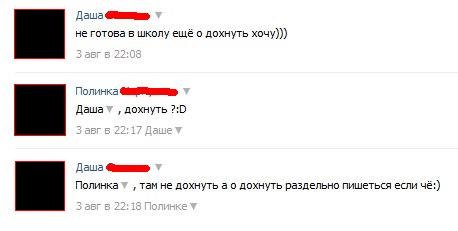Literacy is not in decline

From the moment the Internet comes to our school, children's literacy is getting worse and worse. They often write on the forums with deliberate mistakes (to be “fun”), but as a result they forget the rules of the Russian language. The situation today is catastrophic.
( NGS publication. News from 2006)
Such complaints probably did not appear yesterday, and they can be found, probably in ancient letters. But today, the situation with the language has developed quite new: the literacy on the forums is low, the errors “tsya-tsya”, “from the first” do not stop. (Let’s leave even outside the brackets borrowing - for which there are no strict formal rules.) After all, if you think a nightmare, people are not able to remember simple school rules or even punctuation. Language is waiting for a disaster! Is it really?
The noticeable “contamination” of many languages is not a catastrophe or even a problem, but a symptom of the processes with which the language will cope completely.
')
The essence of the problem seems to be obvious: a lot of people cannot write correctly, makes terrible spelling mistakes, does not want to learn to write correctly and even check with automatic checks (which now even exist in browsers - for example, I use this in Opera).
It seems so, yes, not so. If you are claiming that this is a problem for the whole language and the whole society, try to formulate it. The problem is “the state of the control object does not correspond to the desired one.”
“People write illiterately” is really a problem, by definition, just not of the whole society or the language as a whole, but of individuals. Someone does not like the level of literacy, while others do not notice anything, even without suffering dysgraphia. Some do not even like when others write or speak difficult.
The argument "everyone should write correctly" does not work, because it is not clear how to implement it. There are already many in this “debt”, and so far they have not been charged with anyone. How much should the author of such an announcement? It is not from the Internet, but on the Internet such is full:

The idea is clear to everyone; he did not take time from anyone, did not cause damage, and in general hardly acted maliciously. Making him go to literacy courses? For the sake of one announcement per year? Have mercy! It is too impractical to satisfy the feelings of purists. There is no practical sense - the message and so brought to the addressee. Only the sacral meaning remains, “the language is holy,” and so on. One can agree with this, one can believe, but continue to write with errors, and also correct others:

The only reason that can force many to write correctly is how they look in the eyes of others, plus independent reviews. And this is in its essence similar to politeness: who is ready to exert so much effort in order to show his attention and benevolence and not cause others inconvenience with his inaction.
Is there even a notorious catastrophic decline in literacy?
It seems to be observed in other public areas: in the press, on television, in advertising. All the years since the opening of the market economy (1992) have complained about mistakes and inattention, savings on proofreaders. This concern is well founded, there are indeed more of them, but let's ask ourselves, is it really a decline and a catastrophe? Usually, a catastrophe implies a complete decline of the industry and loss of craft. But after all, on the Internet, as in the press and advertising, the number of people writing in recent years has only increased.
The number of publications has grown, the volume of unique texts, as compared with the Soviet era, has increased by orders of magnitude, because now, for example, publishing a magazine has become very cheap, and there are no administrative barriers. At the same time, the quality of private polygraphy does not differ from typographical, whereas in 1990 the production of small publishing houses (low quality) was visible a mile away. Many wrote monographs on a typewriter until the late 90s. In 1992 there were few printers, they were almost all matrix, monochrome, they did not print everything in a row. Instead, the price tags in the shops were circled with stencils; large signs were generally painted by hand. Nobody even dreamed of brochures and booklets, which today are distributed to the left and to the right. The modern habit of printing everything you can on the printer, we have spread only towards the end of the 90s.
Let us ask ourselves a question: Has literacy dropped among all these people who began to print brochures or announcements? No, they had never written anything to the public before.

Obviously, when the number of people in the field of activity grows, that is, to whom to preserve good skills. At the same time today, anyone who publishes something, sooner or later will receive a complaint of errors, as well as stores get bad reviews about impolite sellers. But only high quality, as some would like, can be preserved only if the letter would turn into an outdated form of expression, a niche form of retro art.
As for the Internet, at the dawn of it, until 2000, it was not used by philologists at all, but the publication of the page was a big deal, and the attitude towards it was special. The situation changed around 2001-2002, when PHP scripts spread, and it became the norm to make a comment section on publications on websites. Then came the massive blogging engines (LJ, Blogspot, WordPress). And from that moment on, the Internet poured a powerful stream of what had previously remained in the reader’s head or was discussed in private. We saw a written speech of the masses of people who had previously written except official memos.
Especially remarkable is the story of the “tongue of bastards” in 2005-2007. He was known before that, but only by Internet philosophers, diogenes, and in 2005 he was picked up by office plankton and domestic workers. Everybody received doses of radiation; many experimented themselves with this alternative spelling. But the main pleasure was protest - against the requirement to write 100% “right”, and when this hobby became mainstream, the pleasure was gone. In 2008, nobody remembered about this anymore. And what, did anyone have forgotten how to distinguish the letter "o" from "a"? Rather, people began to pay more attention to what they write.
Finally, the spread of smartphones has led to people on the Internet who rarely wrote anything at all. Their level did not exactly fall from this. Yes, mobile phones with SMS have long been distributed, but this is purely personal communication, where not everyone perceives indications of errors.
The dissemination of public written discussion is an event comparable in scale to the appearance of the birch bark diplomas in Russia ( gramoty.ru has recently been turned off). Is it possible for those who just started writing a lot yesterday to wait for a high level of language proficiency? Not. How they should pull up this level, and whether we should point out mistakes to the interlocutor are other issues.
Summary
Competent speech is one of the forms of politeness that operates in a public field and almost does not act in a personal one. Until recent years, most Russian-speaking people wrote something only in private correspondence, and public written speech was the lot of specialists. Today, when printing has become widely available, and the Internet literally lies in the pocket of many, we finally began to write en masse to the public. Concerned that, compared with the previous, “elite” era, the readable texts as fallen, is understandable, but there is no disaster here.
Users will sooner or later self-organize and will learn not to make many of the mistakes that are eye-cutting today. On the other hand, the most irregular rules will be dropped. In any case, the language is not waiting for decline, but growth of use and development.
PS when all the battles died down, I was caught by the lecture of the linguist Maxim Krongauz, where he (at 19:00) makes exactly the same conclusions.
Source: https://habr.com/ru/post/231679/
All Articles